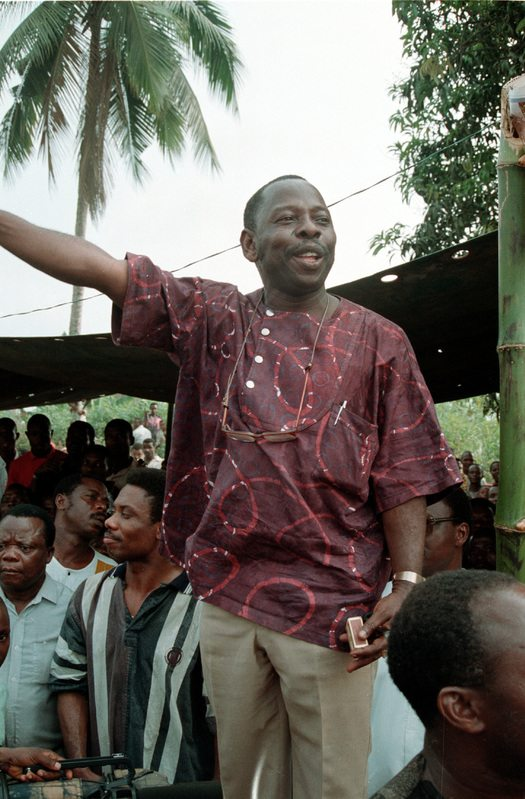Ken Saro-Wiwa was a prominent Nigerian author, activist and television producer. He garnered attention by leading a nonviolent campaign against the multinational petroleum industry. That industry recklessly dumped petroleum waste in Saro-Wiwa’s home region, the Nigerian delta, which gave rise to severe environmental damage.
Saro-Wiwa was born on 10 October 1941 into a prominent Ogoni family. As a child, he demonstrated a talent for scholarship and, upon completing his secondary schooling at Government College Umuahia, he won a scholarship to read English at the University of Ibadan.
He taught briefly at the University of Lagos after graduating in 1965. But he soon left that position to pursue a bureaucratic career, and served as a federal administrator for the Bonny Island oil terminal. Nigeria experienced a civil war between 1967 and 1970, and during the conflict, Saro-Wiwa supported the government’s goal of preventing the state of Biafra from seceding. He gained an appointment as the commissioner for education in the Rivers State as a reward for his support.
He left government service in 1973 because he advocated greater autonomy for the Ogoni people. But he achieved considerable success in that decade in a variety of commercial ventures in real estate and retail. In the 1980s, though, he shifted his focus from business to television production, writing and journalism. He wrote a satirical television series, Basi & Company, which looked at looked at the lives of gang members in Lagos. The series was reportedly the most popular television series in Africa in its day. He also published books such as Sozaboy, and Forest of Flowers, and wrote a regular column for the Lagos Times. He managed to gain an audience beyond Nigeria due to his newspaper writing.
Saro-Wiwa served in one presidential administration in the late 1980s. But his service did not last for long and by the end of the decade he had come to believe that corruption was an entrenched feature of Nigeria’s successive military regimes and that that unfortunate state of affairs could not be challenged from within the existing political structure.
In 1990, he helped found the Movement for the Survival of the Ogoni People (MOSOP). He also wrote the Ogoni Bill of Rights and worked with Greenpeace International. He became the principal opposition leader in Nigeria. And MOSOP was one of the most visible groups that stood in opposition to economic exploitation of Nigeria’s oil resources, and the concomitant environmental fallout.
But his position atop the oppositional hierarchy was far from secure. MOSOP divided into competing factions. Some people within the fold advocated and resorted to violence. And some Ogoni tribal leaders believed in ongoing negotiation with international oil companies. So he found himself between people with irreconcilable approaches.
On 21 May 1994, four people who opposed Saro-Wiwa were killed in an attacked orchestrated by a group affiliated with MOSOP. Saro-Wiwa had typically decried the use of violence. But he was arrested and tried by a Nigerian military court all the same along with eight other people. The defendants were referred to as the Ogoni Nine. Saro-Wiwa was sentenced to death. And despite international protestation regarding the unfairness of the procedure, he was executed by hanging on 10 November 1995 before he could appeal his conviction.
Megathreads and spaces to hang out:
- ❤️ Come listen to music and Watch movies with your fellow Hexbears nerd, in Cy.tube
- 💖 Come talk in the New Weekly Queer thread
- 💛 Read and talk about a current topics in the News Megathread
- 💚 Come and talk in the Daily Bloomer Thread
- ⭐️ September Movie Nominations ⭐️
reminders:
- 💚 You nerds can join specific comms to see posts about all sorts of topics
- 💙 Hexbear’s algorithm prioritizes comments over upbears
- 💜 Sorting by new you nerd
- 🌈 If you ever want to make your own megathread, you can reserve a spot here nerd
- 🐶 Join the unofficial Hexbear-adjacent Mastodon instance toots.matapacos.dog
Links To Resources (Aid and Theory):
Aid:
Theory:

Why do people keep emphasizing the average age in Gaza? Dropping bombs on adults is equally wrong tf
One of the reasons I've seen is that pointing out the average age is 18 and the borders have been closed for 16 years means that for many fighters breaking through the fence this is the first time they've ever been outside their prison.
I can’t speak for every invocation of that fact, but principally it’s a pretty hard to ignore tell that there’s been serious ethnic cleansing there, populations don’t just become 50% 14 and younger like that without something wild happening
And apart from that, I mean you’re right, apartheid is bad always even if it was all 60 year old people but I think people are always gonna have a bit more emotional reaction to young people who barely got to live their life being slaughtered
I feel like the double-standard is just too high, though there is a valid reason for it outside the double-standard.
That said, adults being murdered is bad, period. Could be 18 or 22 or 25 or whatever. Pretty young if you think about it.
But yes, a child dying is worse.
There's probably some pretty deep evolutionary programming that makes us more sympathetic to the plight of children in many cases. I think there's also a general understanding that kids have little or no agency; Whatever you believe about adult Palestinians only a true monster could say that the children have done anything to deserve or justify their plight.